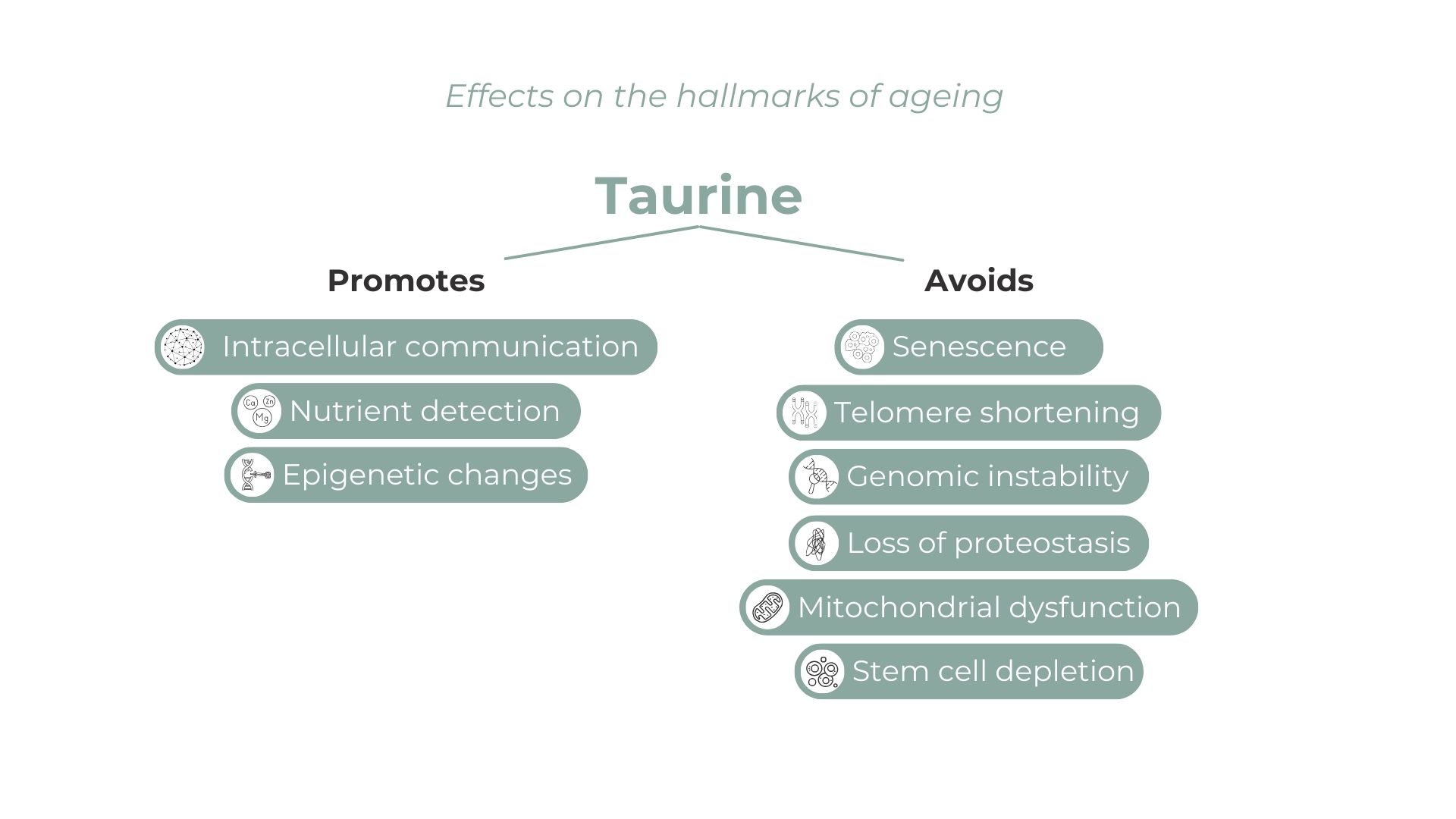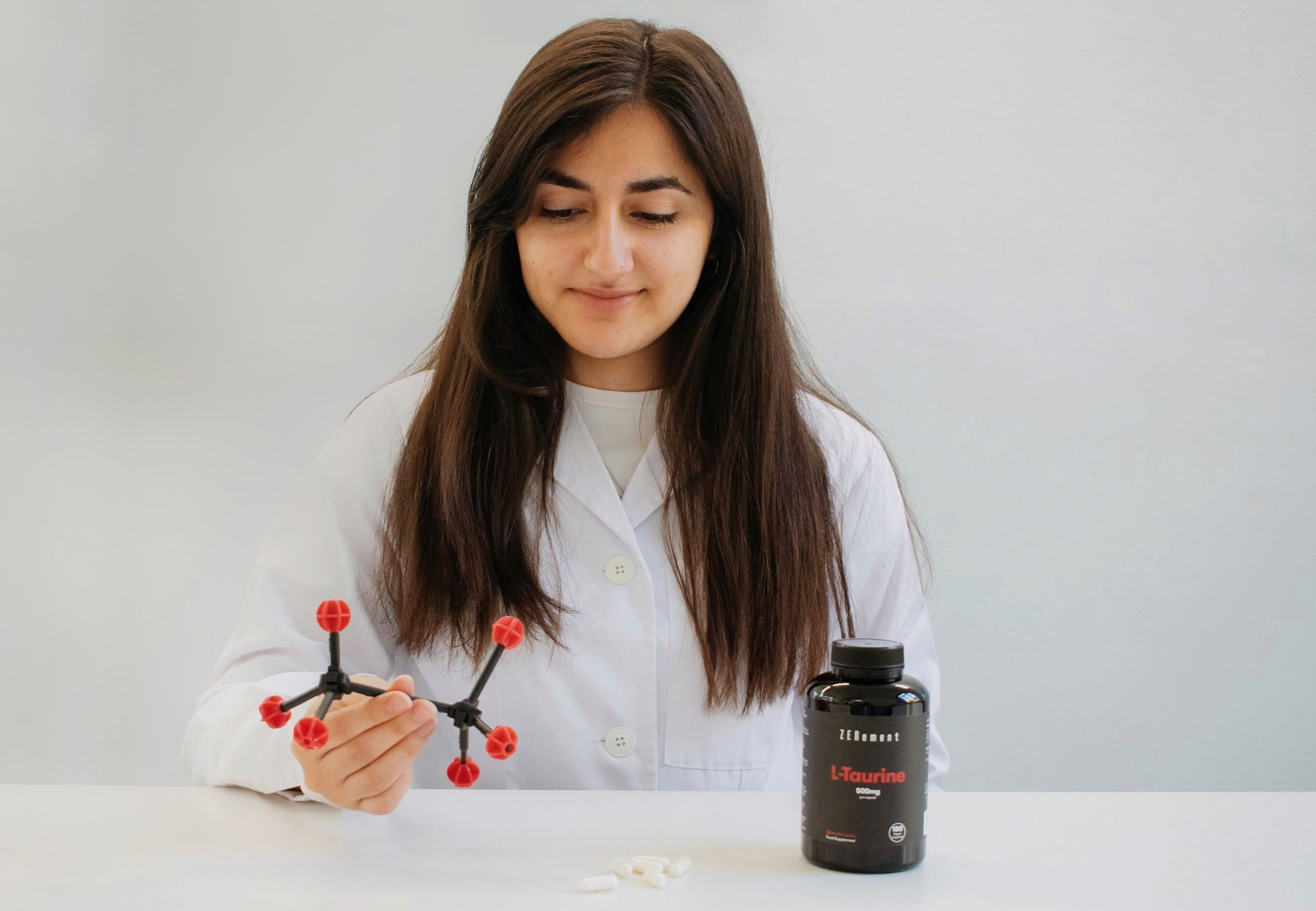Scientific advances never cease, and in recent years L-Taurine has taken center stage in the anti-aging field. By protecting cells from oxidative damage and improving cell function, it is believed that L-Taurine may play a role in preventing early signs of ageing and promoting a healthier life, which recent studies are beginning to show.
What is L-Taurine?
L-Taurine is a sulphur-containing amino acid and is the chemical form of Taurine that occurs naturally in the body and is therefore of biological importance. It is found in some of our excitable tissues (which can respond to stimuli by generating electrical impulses), such as brain cells, the retina, and the heart, as well as in some foods of animal origin, such as meat and seafood [3]. Humans synthesise L-Taurine but rely on exogenous sources during early childhood, and dietary intake of L-Taurine in adults is associated with health benefits [2].
|
Did you know…? L-Taurine was first identified by Tiedemann and Gmelin, who isolated it in 1827 from ox bile (Bos taurus), hence its name "Taurine". However, not much was known about this molecule until the 1990s, when, in 1985, it was first approved in Japan as a treatment for patients with heart failure [4]. |
Associated Functions and Benefits
L-Taurine is involved in protein synthesis, which makes it a crucial component for the regeneration and construction of tissues. It also contributes to muscle support, improving recovery, and physical performance. Antioxidant properties are also attributed to it, helping to protect against free radicals, particularly in the mitochondria [4]. This property is of particular interest when it comes to anti-ageing.
Recent Research on L-Taurine and Anti-Ageing
Ageing is associated with physiological changes that affect everything from our cells to the functionality of our body. These changes manifest themselves as "hallmarks of ageing", which increase the risk of developing certain diseases. Certain molecule concentration changes in our bloodstream are also associated with ageing. Restoring their concentration or functions to normal levels could serve as an anti-ageing intervention [1].
Several studies have shown that the levels of L-Taurine decrease with age. This loss has been associated with poor health and age-related conditions [1,2]. For this reason, several studies are currently being conducted on the effect of L-Taurine supplementation on life expectancy in various species [3].
Therapeutic Potential of L-Taurine Supplementation
As shown by numerous in vitro, in vivo, and clinical studies, L-Taurine supplementation has great therapeutic properties in slowing down key markers of ageing such as increased DNA damage, telomerase deficiency, impaired mitochondrial function, cellular senescence, inflammation, reduced energy production, and oxidative stress. Supplementation with L-Taurine therefore improved the subjects' quality of life in preliminary studies, thereby increasing their overall health lifespan [1,4].
Clinical trials of L-Taurine supplementation provided evidence that exercise increased L-Taurine concentrations in the blood, which may partly explain the anti-ageing effects of exercise [1]. In addition, other recent studies have shown benefits in physical endurance and our health with a single dose of L-Taurine in amounts that vary from 1 to 6 grams [5].

Zenement’s L-Taurine
But how do we ensure we get adequate amounts of L-Taurine? Although our bodies produce this substance, it is sometimes not enough when we follow an active lifestyle or do intense training. Our L-Taurine food supplement is formulated to meet these needs, and is ideal for vegetarian or vegan athletes, as this amino acid is only found in foods of animal origin. With a powerful dose of 1000 mg (1g) per 2 capsules, this food supplement will help you improve your athletic performance, reduce oxidative stress, and support your general well-being.
Source:
Singh, P., Gollapalli, K., Mangiola, S., Schranner, D., Yusuf, M. A., Chamoli, M., Shi, S. L., Lopes Bastos, B., Nair, T., Riermeier, A., Vayndorf, E. M., Wu, J. Z., Nilakhe, A., Nguyen, C. Q., Muir, M., Kiflezghi, M. G., Foulger, A., Junker, A., Devine, J., Sharan, K., … Yadav, V. K. (2023). Taurine deficiency as a driver of ageing. Science (New York, N.Y.), 380(6649), eabn9257. https://doi.org/10.1126/science.abn9257.
Remember that this information is part of the first studies of L-Taurine in the anti-ageing field, but there are still many studies to recommend a standardised dosage of L-Taurine. It is always best to speak to a doctor before taking any supplement to make sure it is suitable for you.
[1] Singh, P., Gollapalli, K., Mangiola, S., Schranner, D., Yusuf, M. A., Chamoli, M., Shi, S. L., Lopes Bastos, B., Nair, T., Riermeier, A., Vayndorf, E. M., Wu, J. Z., Nilakhe, A., Nguyen, C. Q., Muir, M., Kiflezghi, M. G., Foulger, A., Junker, A., Devine, J., Sharan, K., … Yadav, V. K. (2023). Taurine deficiency as a driver of ageing. Science (New York, N.Y.), 380(6649), eabn9257. https://doi.org/10.1126/science.abn9257.
[2] McGaunn, J., & Baur, J. A. (2023). Taurine linked with healthy aging. Science (New York, N.Y.), 380(6649), 1010–1011. https://doi.org/10.1126/science.adi3025.
[3] Caine, J. J., & Geracioti, T. D. (2016). Taurine, energy drinks, and neuroendocrine effects. Cleveland Clinic journal of medicine, 83(12), 895–904. https://doi.org/10.3949/ccjm.83a.15050.
[4] Jong, C. J., Sandal, P., & Schaffer, S. W. (2021). The Role of Taurine in Mitochondria Health: More Than Just an Antioxidant. Molecules (Basel, Switzerland), 26(16), 4913. https://doi.org/10.3390/molecules26164913.
[5] Waldron, M., Patterson, S. D., Tallent, J., & Jeffries, O. (2018). The Effects of an Oral Taurine Dose and Supplementation Period on Endurance Exercise Performance in Humans: A Meta-Analysis. Sports medicine (Auckland, N.Z.), 48(5), 1247–1253. https://doi.org/10.1007/s40279-018-0896-2.


